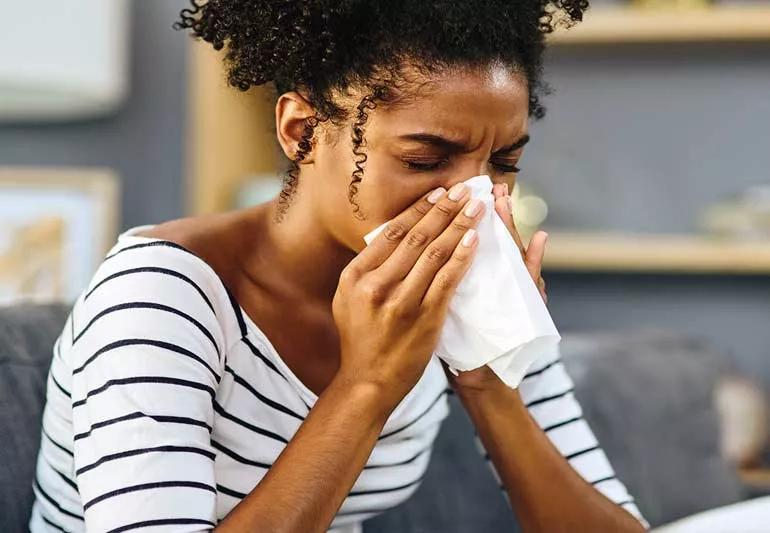You’ll likely have symptoms of both allergies and asthma at once

Tired of constantly sneezing? Allergies alone can make you pretty miserable. But sometimes, what triggers allergies can wreak even more havoc — in the form of asthma.
Advertisement
Cleveland Clinic is a non-profit academic medical center. Advertising on our site helps support our mission. We do not endorse non-Cleveland Clinic products or services. Policy
When you develop sneezing, wheezing and shortness of breath all at once, you may have allergic asthma. Allergic asthma is the most common type of asthma, affecting about 25 million people in the United States.
Allergist and immunologist Ronald Purcell, MD, explains what allergic asthma is and how to manage your symptoms.
So, what is allergic asthma? When your allergies combine with asthma, it’s known as allergic asthma. This causes your airways to tighten whenever you breathe in an allergen.
While many different allergens can trigger allergic asthma, they all have one thing in common: They’re in the environment, not in your food or your medication.
These can include:
If pollen or mold trigger the condition, it may occur only seasonally. If your pets or the dust mites on your bedding trigger it, you may have symptoms year-round, Dr. Purcell notes.
So, what allergic asthma symptoms should you look for?
Allergic rhinitis, or hay fever, affects your nose and sinuses. It may cause the following symptoms:
Asthma mainly affects your lungs. It may cause the following symptoms:
Advertisement
But when you have allergic asthma, you’ll likely develop both sets of symptoms at once.
In children, the symptoms of allergic asthma can be more subtle, notes Dr. Purcell. Kids might say they’re too tired to play, but parents should check for wheezing or coughing.
“If the other kids are running around playing, and your child wants to sit on the sidelines, they may be having trouble breathing,” he says.
Allergy testing can help identify what’s triggering your allergies. Additional testing can help to confirm a diagnosis of asthma.
Once you know you have allergic asthma, identifying and avoiding its triggers will help you control your symptoms.
“When possible, take measures to prevent or minimize exposure,” advises Dr. Purcell.
The same methods won’t work for all allergy triggers. For example, “dust mites aren’t airborne — but cat and dog dander is,” he says.
To reduce allergens in your home, Dr. Purcell recommends:
Although mold is more of an outdoor allergen, it can develop indoors if there’s an unwanted source of moisture (plumbing, roof or basement leaks are common sources of water intrusion).
“Addressing the water leak, then using a diluted bleach solution or a commercial cleaning product is usually sufficient,” says Dr. Purcell. “Extensive mold intrusion may require a professional mold removal service.”
But is allergic asthma dangerous? The good news is that today’s allergic asthma treatments — mainly medication and inhalers — are very effective.
“They’re relatively easy to use and have minimal side effects,” Dr. Purcell says. “When symptoms are more severe or don’t respond to other measures, allergy shots (allergen immunotherapy) is very effective.”
One option that shouldn’t be on the table is letting allergic asthma ruin your quality of life.
“The goal is to manage your condition so that it never limits the activities you love because they trigger an allergic reaction,” says Dr. Purcell.
Working with your doctor will help you find a treatment plan that’s right for you.
Advertisement

Sign up for our Health Essentials emails for expert guidance on nutrition, fitness, sleep, skin care and more.
Learn more about our editorial process.
Advertisement

Wearing a scarf, adjusting your outdoor activities and following your asthma treatment plan can help limit breathing problems

Adult-onset asthma has the same symptoms as childhood asthma, but tends to be more severe

An asthma action plan is a personalized, step-by-step set of instructions for handling asthma attacks

Checking the weather, pollen counts and air quality can help you avoid asthma triggers

Stress can trigger and worsen asthma symptoms, like coughing and shortness of breath

Smoking, including secondhand smoke, can worsen your asthma triggers and damage your airways

Nighttime asthma attacks can be due to acid reflux, allergens and hormonal changes, but treatment can help prevent them

The effectiveness and safety of many of these options are unknown, so it’s best to stick to traditional care

Even small moments of time outdoors can help reduce stress, boost mood and restore a sense of calm

A correct prescription helps your eyes see clearly — but as natural changes occur, you may need stronger or different eyeglasses

Both are medical emergencies, but they are very distinct events with different causes